You are convinced that it could never happen to you, don’t you?
But there is no escaping the fact that you might be stuck out in the wilderness at night.
If you have no experience with camping, or have spent little time in the woods, this can be a frightening and dangerous experience.
Even if you are completely alone, knowing how to do these ten things can keep you safe and in good condition.
If you ever have to survive some sort of disaster and decide to stay in a wooded area, you will be much closer to being able to stay in this setting for weeks, or even months if needed.
Be Mentally and Emotionally Prepared
You emotional and mental preparedness for surviving in the wild should start before you find yourself in the woods and have to face the experience.
Remember, nature is not your enemy. The woods and its inhabitants usually kill or maim only in the course of trying to survive, defend themselves from predators, and raise their young. As long as you do not interfere, you can live comfortably in the woods regardless of the time of day.
If you are reading this and know nothing of living in or traveling through the wilderness, start learning from now. Read articles, go camping with experienced groups of people, and do all you can to gather factual and accurate information on how to live in the woods and understand its inhabitants.
The more you know about living in these conditions, the less you will fear them. The less fear you have, the easier it will be to go about taking care of basic needs if you must stay in a wilderness setting at night.
3 Second SEAL Test Will Tell You If You’ll Survive A SHTF Situation
Maintain Appropriate Body Temperature
As with any other place, temperatures are apt to drop at night. If you did not bring extra clothing, or the right kinds of clothes, you will need to find some other way to keep warm. Here are a few things that can save you:
Plastic Bags
Always keep a construction grade plastic bag with you, it will be large enough to line with leaves or other insulating material to sleep in.
Remember to leave some room open even around your body so that sweat evaporates properly and air continues to circulate around your skin. In extreme cold temperatures, moisture near your skin can cause your core temperature to drop to dangerous levels.
Build a Fire
Learn how to build a fire safely and effectively, including how to build a fire in the rain. Pack a tea light, and remember to search for pine cones. Both will make excellent tinder material.
Don’t forget to bring along a fire starter such as waterproof matches or some other type of fire starter that you feel comfortable with.
Cover Yourself with Leaves
As long as the leaves aren’t damp and are free of bugs, mold, and mildew, they will keep you warmer than not covering with anything at all.
Find and Purify Water to Stay Hydrated
Maybe you aren’t lost, and still expect to arrive back in a populated area in a few hours. Even though you may not think much about water, it is still need it on hand and to stay hydrated all the time.
When you are stressed out, engaging in more intense physical activities, or dealing with increased temperature changes, your body will release more sweat, and also use more water for other vital processes.
So you need clean water on hand and use it when you are trying to survive in the wilderness especially if overnight. Ideally, you should be able to purify at least ½ to one gallon of water for your overnight needs.
Here are some things you can keep with you as well as skills to develop:
- Know how to capture water from leaves, earth, and rainfall.
- Keep a long tube sock, bone char, some sand, and activated carbon in your travel gear at all times. You can use them to make a filter to remove chemical contaminants and debris from the water. It is also important to have some kind of vessel to boil the water in so that you can kill off any pathogens that may be in the water.
- There are also filtering water straws available that come with a complete water cleaning system. Just make sure you drink through the straws, and you will have clean water.
- Carry water purifying tablets. Be sure to always know the limitations of these tablets so that you can use other systems if needed.
- Learn how to make charcoal and bone char.
- Contrary to popular belief, boiling water alone will not produce clean water. It will only concentrate heavy metals and other poisons, making the water more dangerous to drink. If you are concerned about removing pathogens from the water, it is better to put the water in a clear plastic bottle and let it sit in the sun for a few hours. UV from the sun will kill the pathogens without causing water to evaporate.
Obtain Food
You might be too stressed to eat, but it have to know how to get food in the wilderness during the night hours. Since many animals are more active at night, you can try hunting them, or set traps.
If you happen to be near a pond, you can set traps for fish, or try to hunt for frogs.
When hunting at night, always be aware that the animals you are hunting may also be prey for another animal in the woods. That animal, in turn, may decide you are competition and hunt you instead.
Before you go into any wilderness setting, always know how the local food chain works so that you can steer clear of predators and still take the game you need for survival.
As with any other time of day, lichens, moss, berries, and fruit will still be available. Learn the Universal edibility test, and practice using it so that you can avoid being poisoned.
If you decide to carry food with you, choose high calorie items that do not require heating. You can also bring along a few ready to eat meals that come with warming packets if you want a more complete meal. Even if you only have enough packets to last for two or three days, it will be enough until you are able to gather food on your own.
Shelter From Storms, Wind, and Other Bad Weather
Aside from being colder, you may also wind up dealing with rain, wind, or other weather elements that you will not want to be out in.
As long as you have a knife (or a sharp edge on a rock) branches, vines (or long stemmed plants), leaves available you can make a shelter that will keep you dry and warm.
Here are some other things you can try:
Look for a Cave
Caves offer plenty of protection, however they are also likely to be dens for bats, bears, and other animals that won’t want you spending the night with them.
If you do decide to spend the night in a cave, make sure you check all passages and all areas of the cave to make sure you aren’t taking up space in another animal’s territory. This includes snakes, spiders, and other animals that can hide easily under rocks and in shaded areas that you might overlook.
Dig a Hole in the Ground
Dig a small hole or depression in the ground, and then put leaves over it. Try to build up the sides a bit to prevent rain from flowing in. This makeshift shelter will not last more than a few hours, but it will get you through the night.
Tree Trunk Protection
Look for a hollow in a tree trunk, or at the base of an uprooted tree. These areas will shelter you from the wind and rain, depending on the direction it is coming from.
As with caves, make sure there are no animals and insects already living there that might cause you problems. In this case, you would be looking for squirrels, raccoon, snakes, and biting insects known to live in or near rotting wood or in tree trunks.
Discourage Predatory Animals and Prevent Insect Bites
For the most part, if you know how to build a fire and can keep it going through the night, predatory animals will stay away from you.
On the other side the equation, many insects are drawn to light, and will gravitate to the fire. You will need to experiment to find the best distance from the fire to avoid falling outside its light, be close enough to stay warm, and still not be swarmed by insects (that will be killed off eventually by the flames).
Insofar as discouraging predatory animals, you will need to know which ones are usually in the area, and also how best to deter them if they appear. Some animals may run away if you yell, while others may decide to attack. A good understanding of animal psychology is essential.
In order to prevent insect bites at night, your best option will be to wear long sleeved shirts and pants. Make sure that all cuffs are sealed off with rubber bands and that the hems of your pants are also tucked into your socks.
To protect your face and neck from insect bites, take a wide brimmed hat and attach some fine webbed fabric over it. Let the fabric drape down to just below your neck, and then make sure it seals to your shirt. Do not put the fabric too close to your face or neck, or the insects will just find a way to bite through it.
Manage Hygiene and Sanitation
Even though you can washing your hands and face with wet wipes, it never hurts to carry a small bar of lye soap and some towels with you.
In particular, if you are spending the night in the woods because of a nuclear disaster, you will need the lye soap for washing off any dust or debris from your skin.
Managing sanitation is also very important because predators can find your urine and stool even if you bury them. Make sure you stay away from areas where water and food are likely to be found, as predators will check there first for prey.
Take Care of Routine and Emergency Medical Needs
Even if you don’t have any injuries, or don’t feel sick, it is still important to know what to do and have some tools on hand. Here are some things you should carry and skills you should learn:
- know the signs of food poisoning or allergy. Keep Benadryl with you and an epi pen. If you suspect you ate something poisonous, make sure you know how to vomit it back out if it is still in your stomach, or use activated charcoal to try and absorb it and move it out of your system.
- Always know how to make a tourniquet, splints, and wraps for joint support.
- Keep essential oils, herbs, and at least a week’s supply of any medications you may be taking onhand. It also never hurts to know what plants in the woods might be useful for taking the place of your medications if the need arises.
- Know how to perform the Heimlich maneuver on yourself, just in case you are alone and swallow something the wrong way.
- Understand water safety and know how to build a flotation device so that you don’t wind up drowning.
Be Able to Signal for Help
If you were traveling, got lost, and left travel plans, there is a chance searchers will be looking for you. Depending on the weather conditions, rescuers may or may not try to look for you at night. If you built a fire (use a triangle shape), knowing how to create a smoke signal may be of some help.
In addition, if you happen to hear a random chopper overhead, you can try to get their attention with the fire, a flashlight, red laser, or flares if you have them.
Remain Concealed if Needed
During a state of emergency or some kind of major social disruption, you may decide that you’d prefer to avoid the attention of rioters or anyone else that could hurt you. Under these circumstances, building a fire for any reasons is not likely to be an option.
By the same token, sheltering on the ground is also apt to be a problem. Try concealing yourself in a tree or some other location where people aren’t likely to look. If you must stay on the ground, make it a point to cover yourself with leaves or stay in a bunch of brambles so that you are harder to see.
Here are some other things to consider:
- know how to stay perfectly quiet. People pursuing you may have dogs or other tracking animals trained to pick up on even the slightest sound that you make.
- Tracking animals can also pick up on your scent. Never pick a place to rest near where you have buried waste, eaten, or carried out some other task.
- Learn how to use backtracks and other tricks to ensure an animal following your scent cannot pick up your trail.
- People tracking you may also use thermal profile systems or metal finders to locate you and anything you are carrying. It is very important to know how to break up your thermal profile. Try to avoid lumping all metal objects together in your camping gear, or carry as few metallic objects as possible to keep avoid being detected.
Much of surviving in the wilderness at night is about common sense. You will still need some basic tools such as a knife, fire starting gear, heavy plastic bags, and drinking water bottles to make things a bit easier.
As with anything else, even if you start off with a few tools that you know how to use, and then build on your skill and knowledge levels, it will be easier to spend a night in the wilderness, and come to enjoy the experience as many hikers and campers do.
This article has been written by Carmela Tyrell for Survivopedia.


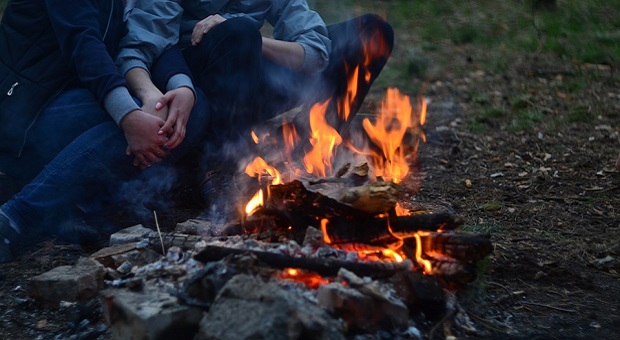
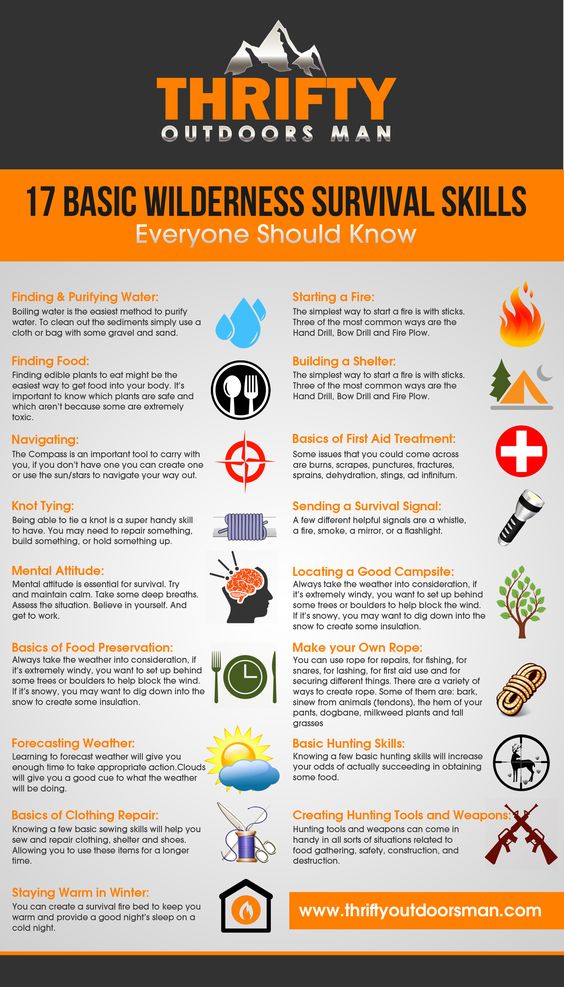

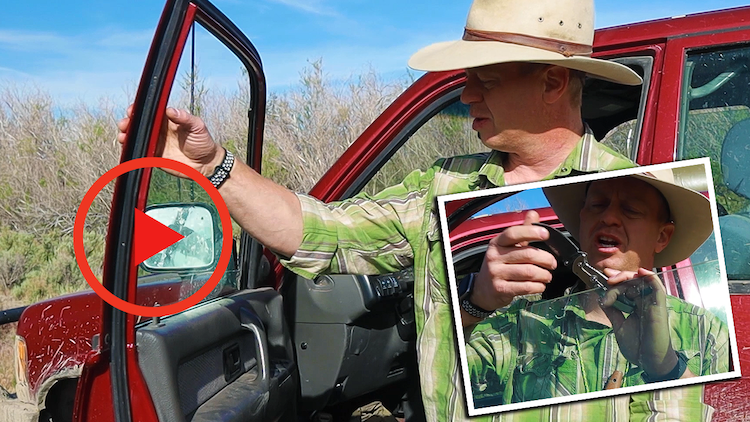
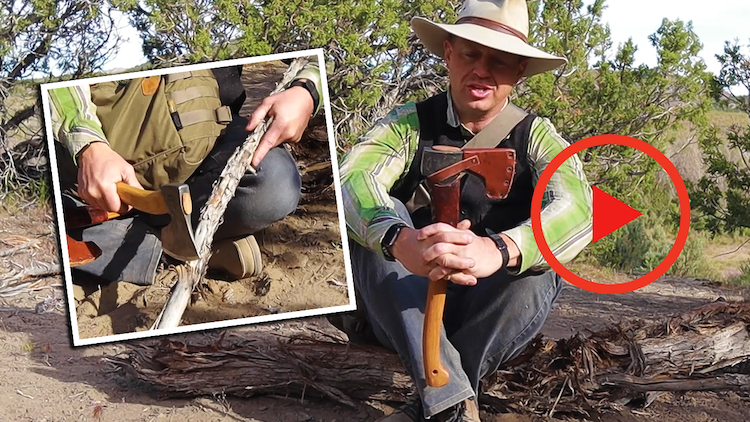
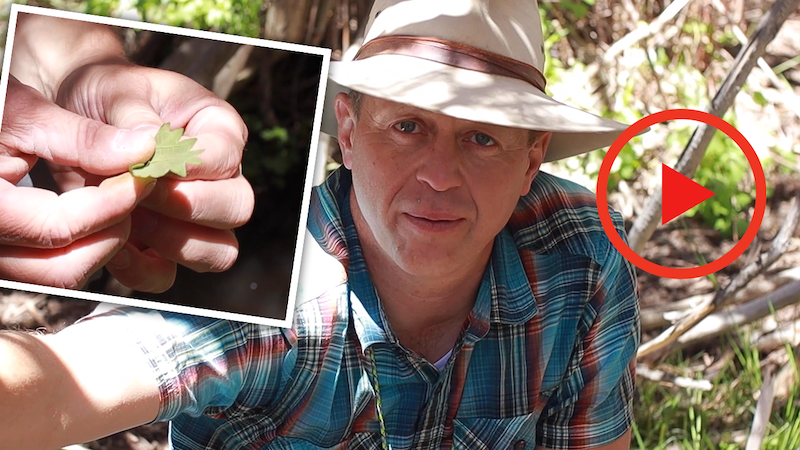
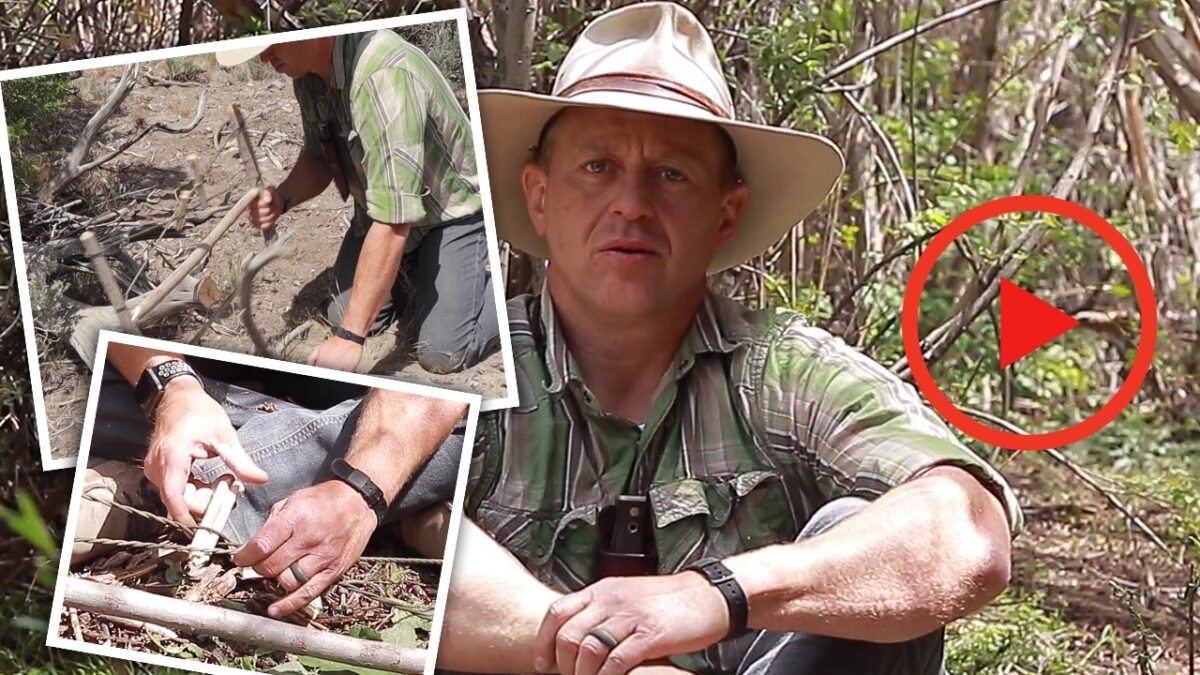


Clergylady | August 20, 2017
|
Good basic advice. Knowledge and experience are your best preperation.
As a kid in a church youth group I’d learned direction finding, knot tying, campcraft, trail blazing and tracking. Mom had shared her knowledge and interest in wild foods and medicines. Dad taught me to problem solve.
A long story but at 21 I spent an unplanned 10 months living alone in the woods. I had grabbed an extra pair of socks, pants, and shirt. My pocket contained half a book of matches and a dull pocket knife. My prized posession became a rusted can that had once contained whole kernel corn. That’s pretty unprepared with stuff but I made it. Some basic knowledge and a love of camping made it possible. I had never hunted, cought and cleaned just one fish but in short order anything that moved was on the menu.
I made it. Knowledge and the ability to think and plan and figure out new things made it possible. Being picky had to go away too. If you live off the land you’d better accept what is available.
Elaine Susan Hilliker | August 20, 2017
|
I think its dangerous to just put your water in the sun for a few hours and expect that all the pathogens will be killed. How long is a few hours? and the time of day you chose for those few hours would certainly affect the outcome. Boiling the water is the only way to be certain all the pathogens have been killed—no guessing! and if you filter the water before boiling, it will take care of any heavy metals.. always keep a mini carbon filter straw such as a life straw, or a sawyer mini filter in your pack and you’ll be golden.
Carmela Tyrrell | August 23, 2017
|
Elaine,
According to the WHO – a minimum of 6 hours.
I have been thinking – for some time now – to order some water testing supplies and show people just how bad the water is these days; and also what methods don’t work or aren’t complete as you may think. The water testing solutions are much more expensive now; though; especially for the heavy metal contaminants. I could write a book on that; and also just how little sink filters do; btw.
Dean | August 21, 2017
|
I have to say that this article was contradictory. you’re mixing two different scenarios….being prepared to be in the wilderness, and suddenly getting thrust into the wilderness, unprepared. Either way, this article shows that the author doesn’t fully understand what is being presented. some of what is presented could actually put the person in worse shape.
• “Contrary to popular belief, boiling water alone….” – This whole point is ridiculous. You’re mixing two issues together. No, boiling water will not remove harmful chemicals. But boiling water is one of the BEST methods for killing microbs, etc, such as crypto, giardia, campylobacter, etc. I don’t know where you got your info from on boiling water, but the authorities on the subject recommend boiling, if no other method is available. Now removing other harmful chemicals is a whole different subject. That would require either filtering and/or distillation.
I don’t know where you got the bogus notion that just letting water sit in a plastic bottle for a few hours would allow the UV to kill the bacteria. Water normally sits in sunlight (UV) all the time. If just UV from sunlight was enough, then all water sitting in the open would be microb-free. It takes MUCH more concentrated UV than from just sunlight. That’s why UV pens are sold. Why you didn’t recommend carrying one of those I don’t know, since someone who got “stuck out” would have a lot of other supplies with them, according to this article.
• Dig a hole in the ground….build up the sides to prevent rain from flowing in. Really? You’re recommending someone sleep in a hole when it’s raining? Last time I checked, water will GATHER in a hole when it gets rained on.
• I don’t know of any carnivorous squirrels that one would need to worry about.
• Smoke from a fire is a very good insect repellant.
• As with the construction grade garbage bag, are people really going to be going about their usual business carrying fine-webbed fabric in their pockets, to put over the wide-brimmed hat that they also don’t have in their pocket?
• “Managing sanitation….” – predators may find your cathole (for urine/stool), but I think your bigger worry is having it too close by your source of drinking water.
• “Know how to stay perfectly quiet….from nearby dogs” – do you not realize that a tracking dog, such as a police dog can actually HEAR your HEARTBEAT? But likely they’ll pick up your scent long before that, unless you’re VERY careful.
• “lumping all metal objects together in your camping gear” – what, are you going to do, drag them behind you? If you’re being searched with metal detectors, anything you have metallic will be visible.
Concluding remarks: If you PLAN to be out in the wilderness, why not just carry: shelter, extra clothes, water purification methods, AND A GUN for protection, along with all the other necessities (no need for a construction grade plastic bag)? If one PLANS to be out, then most of this article is a moot point. If you suddenly end up out in the wilderness without all of your gear, then that is a whole different scenario, and again, much of this article is again a moot point. Without at least a knife and possibly either experience at starting fires, things will be much tougher.
Clergylady | August 23, 2017
|
You either have gear or dont have gear. Good sense and good knowledge will carry you a long way on the journey.
Get busy and learn all you can about survival skills. Then with gear it is easier. Without gear it is still possible to survive.
Carmela Tyrrell | August 23, 2017
|
Dean,
To begin – I am surprised – often overwhelmed by the number of people that don’t know how to clean water correctly or the methods available. yes – boiling water kills pathogens – I am not, nor have I ever disputed that. The problem is you cannot say water is safe to drink just because it is pathogen free; at least not in these times. Today, most potable water supplies – including municipal water, streams – are all polluted either by farm runoff or industrial runoff. When you boil water, there is less left in the container, while the pesticides and heavy metals remain behind. Since there is less water in the vessel, the pollutants are more concentrated. It’s simple math.
Insofar as UV purification – it takes about 6 hours, and is recommended by the wHO – world health organization for areas where boiling water or other methods are not feasible.
http://www.who.int/household_water/research/technologies_intro/en/
Also – activated carbon is wonderful – i recommend it highly – but – there are some contaminants it won’t remove. You need to be adding bone char to get rid of all heavy metals. if you are buying water straws – they must include this ingredient, or have a dedicated filter chemical for this purpose. distillation will work (obviously).
Digging a hole in the ground is used by soldiers throughout the world for defensive positions. they also serve as shelter and are known as foxholes. Some are more elaborate than others.
http://therevolutioncenter.com/war/how-to-dig-a-foxhole/
squirrels may not be carnivorous, however that is no reason to assume they will not attack under certain situations. they will defend their home; so if you wander into their tree home and try to take up residence, they might try to bite or scratch; just as a bee will sting to defend itself if you step on it by accident.
exactly my point about tracking animals and scent- they will pick up the smell of your footprints and other things long before they hear your heartbeat – so take care of scent cover first.
for metals in camping gear – don’t put them in the same part of the pack. the smaller the signature, the better chance a viewer will think it is just junk that may have been dropped long ago.
i wrote this article mainly with the premise that a person is in the woods without any prior planning, and few if any camper or prepping skills.
matt | September 16, 2017
|
Dean’s comments are spot on. He has been out there